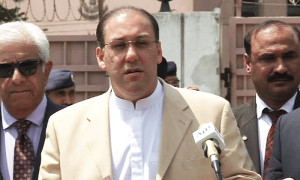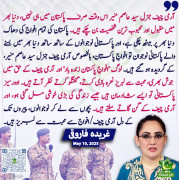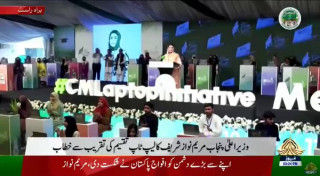You are using an out of date browser. It may not display this or other websites correctly.
You should upgrade or use an alternative browser.
You should upgrade or use an alternative browser.
پاکستان میں کاروبار کرنا مشکل ہوگیا
- Thread starter Kashif Rafiq
- Start date
ptilover788
MPA (400+ posts)
keep the tajarba up up up
Fakhre Alam
Minister (2k+ posts)
Ab patwari hazrat yahan nazar nahi ayengy. In ko apny khariday huay surveys ki adat jo parh gai hy.
Exnooni
Minister (2k+ posts)
Dareconomics: Business Freedom in Pakistan slips further
Pakistan now 138th among 189 economies

Country was re-ranked to 136th for last year as World Bank changes methodology. PHOTO: PAKI MAG


ISLAMABAD:
It might come as a surprise to PML-N supporters, but its pro-business perception received a slight jolt on Wednesday, as Pakistan slid two places to be ranked 138th on the ‘Ease of Doing Business Index’ of the World Bank.
Pakistan improved its distance to frontier (DTF) score, from 51.62 to 51.69, but slid in the list of 189 economies of the world, ranked in terms of the ease it offers to entrepreneurs in doing business.
Three reasons to keep counting on Pakistan
The country was originally ranked 128th last year, but the World Bank changed its methodology and repositioned the 189 economies. Effectively, Pakistan was re-ranked 136th for last year, meaning the country slid two places as it witnessed an overall deterioration in the regulatory and enabling environment for starting and doing business.
The report also gauged the efficacy of the bureaucracy and the nature of business governance, finding Pakistan not doing too well in these areas.
The Doing Business 2016 report is the flagship annual publication of the World Bank Group and is considered as the world’s most influential policy publications.
The World Bank’s message
Countries like Bhutan claimed South Asia’s highest spot in the ease of doing business ranking, at 71st, followed by Nepal (99th) and Sri Lanka (107th). India stood at 130th, followed by Pakistan, Bangladesh (174th) and Afghanistan (177th).

The rankings are benchmarked to June 2015 and are determined on the basis of 10 pillars, each consisting of several indicators.
Minor improvement
Out of the 10 pillars, Pakistan’s position improved on only three. It showed a major improvement on dealing with construction permits, improving from 125 to 61, and enforcement of contracts where it improved the standing by 10 points to 151. On the indicator of paying taxes, the country’s position improved by one point to 171.
World Bank projects: Pakistan’s economic growth at 4.4%
Weak points
The major deterioration was in trading across borders where the country slipped from 108th position to 169th. Pakistan’s rank deteriorated in starting a business, getting electricity, registering property, getting credit, protecting minority investors, trading across borders and resolving insolvency.
“The two-point slippage is marginal, but yes, the government needs to work harder and smarter to improve the overall ranking”, said Board of Investment Chairman Miftah Ismail, while talking to The Express Tribune.
He said during the last one year, his department focused mainly on two areas -dealing with construction permits and enforcing contracts and there was improvement on both pillars.
On the index of starting a business, the total number of procedures required to register a firm remained unchanged at 10. Similarly, the total number of days required to register a firm also remained unchanged at 19.
Getting electricity remained an area of concern and the country’s performance deteriorated. It takes 178.3 days to obtain a permanent electricity connection – worse than last years’ duration of 173 days. On the benchmark of reliability of supply and transparency of electricity tariff, the country was at the bottom.
The total number of days required to register property remained unchanged at 50. There were six kinds of procedures for getting a property registered.
The country’s position on protecting minority investors deteriorated by four notches to 25 but it remained impressive.
Despite an improvement of one notch to 171, paying taxes remained another area of concern. Businesses were required to make 47 kinds of tax payments, which consumed 594 hours or 25 days. They paid 32.5% of their income in taxes. For enforcing contracts, it took two years and seven months besides consuming 23% of the disputed claims.
On the index of trading across the borders, Pakistan slipped 61 notches. It took 62 hours for documentary compliance, 79 hours for border compliance and 13.5 hours for transportation before exporting a consignment. The cost of documentary compliance was $307, border compliance $456.4 and transport cost was $12.2.
The situation was worse in case of imports where it took 152.6 hours for documentary compliance, 140.6 hours for border compliance and 12.2 hours on transportation of the consignment.
Published in The Express Tribune, October 29th, 2015.
Source
Pakistan now 138th among 189 economies

Country was re-ranked to 136th for last year as World Bank changes methodology. PHOTO: PAKI MAG


ISLAMABAD:
It might come as a surprise to PML-N supporters, but its pro-business perception received a slight jolt on Wednesday, as Pakistan slid two places to be ranked 138th on the ‘Ease of Doing Business Index’ of the World Bank.
Pakistan improved its distance to frontier (DTF) score, from 51.62 to 51.69, but slid in the list of 189 economies of the world, ranked in terms of the ease it offers to entrepreneurs in doing business.
Three reasons to keep counting on Pakistan
The country was originally ranked 128th last year, but the World Bank changed its methodology and repositioned the 189 economies. Effectively, Pakistan was re-ranked 136th for last year, meaning the country slid two places as it witnessed an overall deterioration in the regulatory and enabling environment for starting and doing business.
The report also gauged the efficacy of the bureaucracy and the nature of business governance, finding Pakistan not doing too well in these areas.
The Doing Business 2016 report is the flagship annual publication of the World Bank Group and is considered as the world’s most influential policy publications.
The World Bank’s message
Countries like Bhutan claimed South Asia’s highest spot in the ease of doing business ranking, at 71st, followed by Nepal (99th) and Sri Lanka (107th). India stood at 130th, followed by Pakistan, Bangladesh (174th) and Afghanistan (177th).

The rankings are benchmarked to June 2015 and are determined on the basis of 10 pillars, each consisting of several indicators.
Minor improvement
Out of the 10 pillars, Pakistan’s position improved on only three. It showed a major improvement on dealing with construction permits, improving from 125 to 61, and enforcement of contracts where it improved the standing by 10 points to 151. On the indicator of paying taxes, the country’s position improved by one point to 171.
World Bank projects: Pakistan’s economic growth at 4.4%
Weak points
The major deterioration was in trading across borders where the country slipped from 108th position to 169th. Pakistan’s rank deteriorated in starting a business, getting electricity, registering property, getting credit, protecting minority investors, trading across borders and resolving insolvency.
“The two-point slippage is marginal, but yes, the government needs to work harder and smarter to improve the overall ranking”, said Board of Investment Chairman Miftah Ismail, while talking to The Express Tribune.
He said during the last one year, his department focused mainly on two areas -dealing with construction permits and enforcing contracts and there was improvement on both pillars.
On the index of starting a business, the total number of procedures required to register a firm remained unchanged at 10. Similarly, the total number of days required to register a firm also remained unchanged at 19.
Getting electricity remained an area of concern and the country’s performance deteriorated. It takes 178.3 days to obtain a permanent electricity connection – worse than last years’ duration of 173 days. On the benchmark of reliability of supply and transparency of electricity tariff, the country was at the bottom.
The total number of days required to register property remained unchanged at 50. There were six kinds of procedures for getting a property registered.
The country’s position on protecting minority investors deteriorated by four notches to 25 but it remained impressive.
Despite an improvement of one notch to 171, paying taxes remained another area of concern. Businesses were required to make 47 kinds of tax payments, which consumed 594 hours or 25 days. They paid 32.5% of their income in taxes. For enforcing contracts, it took two years and seven months besides consuming 23% of the disputed claims.
On the index of trading across the borders, Pakistan slipped 61 notches. It took 62 hours for documentary compliance, 79 hours for border compliance and 13.5 hours for transportation before exporting a consignment. The cost of documentary compliance was $307, border compliance $456.4 and transport cost was $12.2.
The situation was worse in case of imports where it took 152.6 hours for documentary compliance, 140.6 hours for border compliance and 12.2 hours on transportation of the consignment.
Published in The Express Tribune, October 29th, 2015.
Source
Last edited by a moderator:
Sary mulk mein karobar kerna,taleem hasil kerna,nokri kerna sans leena sub kuch mushkil hogaya hai.mager inn haram Za*d oon ka karobar kerna aur ayashi kerna asan.
Begheret tu wo awam bhi hain. Jo inn sub ki haram khori mein inn ka sath dy rahi hai. Inn ko govt mein lati hai.
khud tu zalil hain sari qoom ko bhi zalil ker dety hain inn haram khoroon ke hathoon.
Begheret tu wo awam bhi hain. Jo inn sub ki haram khori mein inn ka sath dy rahi hai. Inn ko govt mein lati hai.
khud tu zalil hain sari qoom ko bhi zalil ker dety hain inn haram khoroon ke hathoon.
Wake Up Pakistan
Chief Minister (5k+ posts)
Yeah Sub Report Pakistan kay khilaaaf hee jani hai Ta kay In ko Trap mai rakha jayai aur Zaida zaida Shartain manwaee jayain Qarzoo pai.
Jub Insaaan bikari ke Zindagi jeeta hai tou phir yahee haal hota hia
Jub Insaaan bikari ke Zindagi jeeta hai tou phir yahee haal hota hia
sohnidhartie
Minister (2k+ posts)
Aor Mian saanp k lee a aasaan.
xiaahmad
Chief Minister (5k+ posts)
WorldBank Report: Pakistan Ranking Down by 10 Places

Ease of doing business: Pakistan slips down in global rankings
ISLAMABAD: Pakistans global ranking has slipped by 10 places in ease of doing business, standing at 138th position among 189 countries, as the countrys performance deteriorated on almost all indicators, particularly on benchmarks of getting an electricity connection and paying taxes.
The Bank annual report Doing Business 2016, measuring regulatory quality and efficiency states that businesses in Pakistan estimated losses due to power outages at up to 34 percent of annual revenue, while capital (domestic and foreign) tends to be attracted to countries that are able to offer a reliable and competitively priced supply of electricity.
The report ranks Pakistan sixth amongst South Asian countries, below Sri Lanka, Maldives, Nepal, India and Bhutan with Bangladesh and Afghanistan trailing behind. India moved up by 12 places from 142 to 130, Sri Lanka moved up from 113 to 107, Maldives ranks at 125, up from 128, Bangladesh down at 174 against 173 and Afghanistan moved up to 177 in 2015 against 183 in 2014. Nepal and Bhutan are the only South Asian countries ranked within the first 100. Nepal dropped five places over last year from 94 to 99 and Bhutan climbed from 71 to 70.
Getting electricity, paying taxes, trading across borders and enforcing contracts account for Pakistans lower ranking in ease of doing business. Pakistan received the lowest rank, 171, on paying taxes, 157 on getting electricity while it takes 178 days to get an electricity connection in the country against 70 days in Nepal, 114 days in Afghanistan, 428 days in Bangladesh and 90 days in India.
India received the lowest rank of 178 on enforcing contracts. However it was ranked at 70 i.e. better than Pakistan on getting electricity and 157 on paying taxes. Bangladesh ranked 189 on getting electricity, but better than Pakistan and India - at 86 - on paying taxes.
Pakistan performs better in starting a business ranking at 122, registering property at 137, dealing with construction permits at 61 and enforcing contracts at 151 against India at 155, 138, 183, and 178 respectively.
Data in Doing Business 2016 are current as of June 1, 2015, measuring the regulations that enhance business activity and those that constrain it. The report presents quantitative indicators on business regulations and the protection of property rights that can be compared across 189 economies.
Doing Business measures regulations affecting 11 areas of the life of a business. Ten of these areas are included in this years ranking on the ease of doing business: starting a business, dealing with construction permits, getting electricity, registering property, getting credit, protecting minority investors, paying taxes, trading across borders, enforcing contracts and resolving insolvency. Doing Business also measures labor market regulation, which is not included in this years ranking.
India has implemented two reforms during the past year. In starting a business, India eliminated the requirements for a paid-in minimum capital and a certificate to commence business operations, significantly streamlining the process for starting a business.
http://epaper.brecorder.com/2015/10/29/1-page/702542-news.html

Ease of doing business: Pakistan slips down in global rankings
ISLAMABAD: Pakistans global ranking has slipped by 10 places in ease of doing business, standing at 138th position among 189 countries, as the countrys performance deteriorated on almost all indicators, particularly on benchmarks of getting an electricity connection and paying taxes.
The Bank annual report Doing Business 2016, measuring regulatory quality and efficiency states that businesses in Pakistan estimated losses due to power outages at up to 34 percent of annual revenue, while capital (domestic and foreign) tends to be attracted to countries that are able to offer a reliable and competitively priced supply of electricity.
The report ranks Pakistan sixth amongst South Asian countries, below Sri Lanka, Maldives, Nepal, India and Bhutan with Bangladesh and Afghanistan trailing behind. India moved up by 12 places from 142 to 130, Sri Lanka moved up from 113 to 107, Maldives ranks at 125, up from 128, Bangladesh down at 174 against 173 and Afghanistan moved up to 177 in 2015 against 183 in 2014. Nepal and Bhutan are the only South Asian countries ranked within the first 100. Nepal dropped five places over last year from 94 to 99 and Bhutan climbed from 71 to 70.
Getting electricity, paying taxes, trading across borders and enforcing contracts account for Pakistans lower ranking in ease of doing business. Pakistan received the lowest rank, 171, on paying taxes, 157 on getting electricity while it takes 178 days to get an electricity connection in the country against 70 days in Nepal, 114 days in Afghanistan, 428 days in Bangladesh and 90 days in India.
India received the lowest rank of 178 on enforcing contracts. However it was ranked at 70 i.e. better than Pakistan on getting electricity and 157 on paying taxes. Bangladesh ranked 189 on getting electricity, but better than Pakistan and India - at 86 - on paying taxes.
Pakistan performs better in starting a business ranking at 122, registering property at 137, dealing with construction permits at 61 and enforcing contracts at 151 against India at 155, 138, 183, and 178 respectively.
Data in Doing Business 2016 are current as of June 1, 2015, measuring the regulations that enhance business activity and those that constrain it. The report presents quantitative indicators on business regulations and the protection of property rights that can be compared across 189 economies.
Doing Business measures regulations affecting 11 areas of the life of a business. Ten of these areas are included in this years ranking on the ease of doing business: starting a business, dealing with construction permits, getting electricity, registering property, getting credit, protecting minority investors, paying taxes, trading across borders, enforcing contracts and resolving insolvency. Doing Business also measures labor market regulation, which is not included in this years ranking.
India has implemented two reforms during the past year. In starting a business, India eliminated the requirements for a paid-in minimum capital and a certificate to commence business operations, significantly streamlining the process for starting a business.
http://epaper.brecorder.com/2015/10/29/1-page/702542-news.html
Nadir Bashir
Minister (2k+ posts)
ویسے اصولا یہ رپورٹ شائع نہیں ہونی چاہیے
یار ورلڈ بینک پلڈاٹ سے یہ رپورٹ تیار کیوں نہیں کرواتا-نواز شریف ٹو شہباز شریف
© Copyrights 2008 - 2025 Siasat.pk - All Rights Reserved. Privacy Policy | Disclaimer|






































